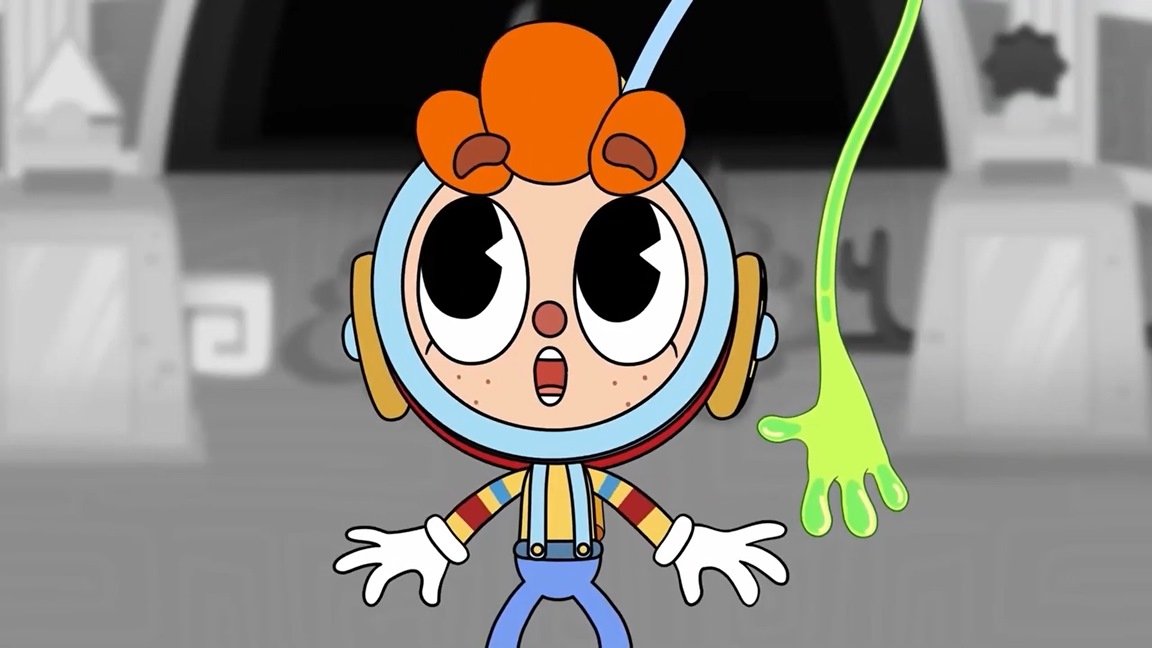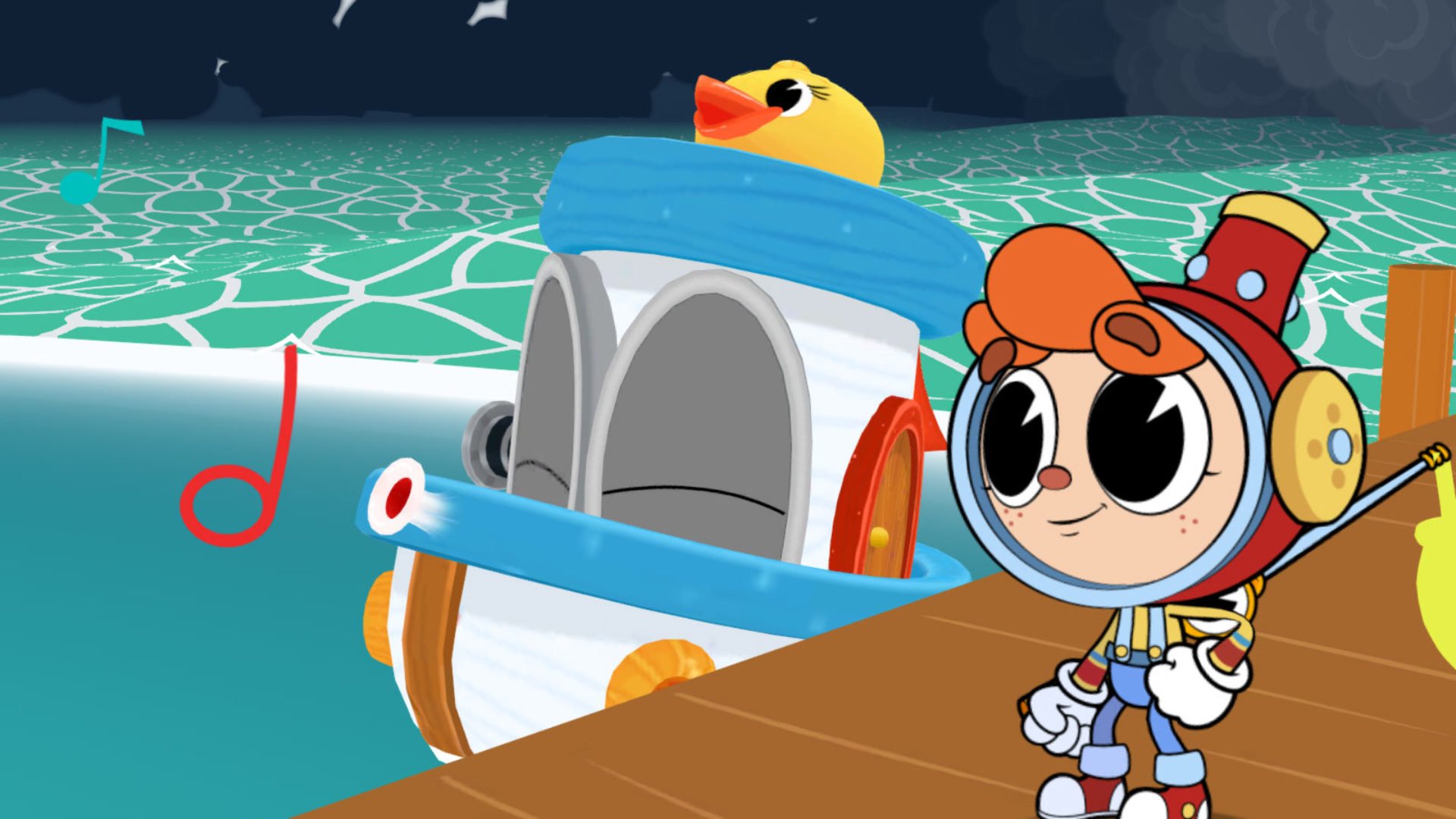Interview | ManaVoid, Rainbow Billy and Creating a Rainbow Hero
Booting up ManaVoid Studios’ Rainbow Billy: The Curse of the Leviathan will surely fill players with immediate delight upon seeing the adorable character designs, and vibrant environment. The colourful title is a family-friendly puzzle platformer with an emphasis on non-violent combat. This world of imagination has been turned black and white by the monstrous Leviathan, and it’s up to shy, cheerful Billy to bring back the brightness and encourage everyone to show their true colours.
OH NO! Someone slipped and spilled monochrome all over this lovely video game!
With Rainbow Billy, ManaVoid has successfully crafted a wonderful all-ages adventure that champions its core values of inclusion and diversity, in large part to their choice to include a non-binary protagonist. This puts ManaVoid and Rainbow Billy in the somewhat terrifying position of leading the charge in inclusivity and representation in games, at least for the time being.
I recently had the pleasure of chatting with studio CEO, Christopher Chancey, and Art Director, Anthony Vaucheret about all things Rainbow Billy, including the real-life story that inspired the game, and the importance of inclusion.
First of all, congratulations on your launch! How have you found the response so far?
Christopher Chancey, game designer, programmer, writer and CEO of ManaVoid.
CC (Christopher Chancey): We’re really thrilled with the response so far. The reviews are all positive, the feedback has been really heartwarming and we’ve been engaging a lot with fans on social media so it’s great!
We’ve seen streamers cry happy tears while playing the game and parents telling us how the game has allowed their kids to communicate better and stimulated some interesting discussions… We couldn’t really be prouder of the game we’ve just launched.
Rainbow Billy is a really charming adventure RPG both in terms of premise and art style, can you talk about the inspiration behind those two things?
Anthony Vaucheret, character and art designer at ManaVoid.
AV (Anthony Vaucheret): It really started out with a love for old Disney cartoons, being inspired as a kid, and learning a lot through the stories told on screen. When me and Chris started brainstorming for the game, I wanted a game in black and white, while he wanted colour… So we compromised and did both! The art style evolved a lot throughout production as well, everyone on the team brought their ideas into it and the cartoon style we ended up with is a mix of older cartoons and more of a modern 90’s style.
Once we had the mechanics and design pillars nailed down, we began exploring where those things were taking us and that’s how we landed on having a game about diversity and inclusivity at the core of our values.
Was there a real-life story that initially inspired the game’s conception or was it an accumulation of various experiences within the LGBTQ+ community?
AV: When I was young at around five years old, my parents divorced and my father came out as a homosexual. After learning this from my mother, who was raised in a very religious Latino family, this created an evil image of my father. He was referred to as a monster, unnatural, evil, unaccepted by God, dangerous, sick, and countless other things. At that point, I couldn’t even look him in the eyes.
Billy gives much better advice than like 90% of the people I know.
When I was 18, I slowly began to understand that the evil image my family created of my father was fake. Being homosexual isn’t evil. My father was and still is a very kind person. By reconnecting with him, I converted the monstrous image I had of my father to who he was in reality. I was really happy to find my father again.
After all of this, I was angry at my mother for all these years. At the same time, I realised that she was only trying to protect us with what knowledge she had. Who was I supposed to be angry with? My grandparents? Society?
My mother's adult point of view turned something as simple as my father's sexuality into a major problem - even if in reality it wasn’t one. As a child, all of this negativity towards my father turned him into a monster in my eyes. This is where the Leviathan and the World of Imagination came to life.
For Rainbow Billy, we went with something softer that has the same feel. A father that doesn't know how to act towards a situation that overwhelms him. For a moment, he will be the villain of the story and his choices will be interpreted badly, but in the end, he just doesn’t know how to react to Billy. That's what happened to me and what has happened to a lot of people. Sometimes it only takes a conversation and a new point of view to understand another person.
Billy goes by them/they pronouns, how did the decision to have a non-binary protagonist come about?
CC: The representations of black and white felt like old binary ways of thinking, so we created the Leviathan as a patriarchal figure, Billy keeping their colours was a way of celebrating being unique! As we were designing the game the coming-of-age story fell into place of a kid trying to understand where they fit in the world. Although the game isn’t designed to be preachy, we know that the non-binary community can feel the nuances that we put in the game and that means the world to us.
Me and the squad rolling up to the first Pride post Coivd.
Representation is important in games, particularly for a younger audience, so hopefully seeing Billy and more characters celebrating diversity will enact changes that we will only be able to see in many many years. Gotta start somewhere though!
Billy being non-binary is of course great representation! How do you feel the current state of non-binary representation is as a whole in gaming at the moment?
I would pay too much money for a Rubber-ducky modeled after Billy’s boat friend here.
CC: Without targeting trans and non-binary communities specifically, I’d say the video game industry still has a ways to go in order to actually represent the right percentage of diverse developers and gamers out there in general. I think we are living in very polarising times, people are afraid to tell stories with characters that are different than they are for fear of backlash... When in fact these communities are super open and willing to help developers learn more about them and see themselves on-screen! Surround yourselves with diversity consultants and talk to the communities, in the end, it makes the stories and the games much better!
There’s no traditional combat in Rainbow Billy, instead resolving problems comes in the form of the confrontation system where you talk and listen to the creatures you meet. Can you elaborate on how developing the system came about, and the choice for the game to be non-violent?
AV: The confrontation system is probably the part of the game we ended up iterating the most on. At some point, there was a match-3 system somewhere in there… Haha.
THINGS ARE ABOUT TO GET RED HOT!
(but not violent ok!)
As we were designing the game and taking a D&I[Diversity and Inclusion] approach it stopped making sense to have characters “attacking” and “defending” in a traditional turn-based RPG. We decided to redesign the system to focus on colours and dialogue. This works with our rhetoric, in the end, communication and empathy are the most effective ways of enacting change and bringing people together, so that was the backbone of that system. We’re really happy with how it turned out!
Rainbow Billy is an all-ages adventure, was it always the intention for the game to be family-friendly, and to perhaps even open up those conversations about self-identity and discovery?
CC: Not initially, we discovered this part of the game as design chugged along. This is the first game we’ve worked on where we actually had the right amount of funds to be able to do a thorough pre-production period and iterate.
Paint the town RAINBOW!
When we decided that we were going to tell Billy’s story as a non-binary character, we knew our aesthetic was going to appeal to a younger crowd so we decided to take the Disney approach and make a super accessible game that kids can enjoy, but parents can understand the subtleties of. This was particularly apparent in the writing, we iterated a bunch with some consultants on our publisher Skybound Games’ side. Talking about mental health and self-identity in a way a kid would see it is quite a challenge. From what we’re seeing online, I think we did alright. :D
The game has a fantastic emphasis on inclusivity, empathy, and expression. What do those values mean to ManaVoid as a studio?
CC: We are strong advocates for more diversity in studios, me and Tony both teach game development in universities and we still see a lot of white men coming up through the ranks so we’re trying as much as possible to enact the changes we want to see elsewhere. We try our best for everyone on the team to feel empowered and heard, to share their ideas and experiences, to give their take on certain subjects… In the end our team really made this game a better experience because each touchy subject matter was thought about and treated with love and care by the team.
What advice would you give fellow developers who are looking to champion more inclusivity and diversity within their own games?
CC: Don’t be afraid to include characters that are different than you are, just surround yourself with people who can help you develop that character in the right way. If you can, hire people around you who are different, it always makes better games!
Finally, what are you hoping players will take away from their time with the game?
CC: Simple. We hope gamers of all ages just have fun playing it! If they learn or feel something while they’re doing that, then I guess that’s cool too... ;)
AV: We hope that everyone can see a bit of themselves in Billy, we hope it makes people think twice before judging a book by its cover and we hope that we can generate a few more positive vibes out there!
*Holds up Billy in one hand like Marge holding that Potato*
”I just think they’re neat!”
Rainbow Billy: The Curse of the Leviathan is now available to purchase on Nintendo Switch, PC, PS4, and Xbox One. You can stay up to date with all things Rainbow Billy, and the rest of ManaVoid’s work on Twitter.
[Editor’s note: this interview was conducted via email and we have updated certain spellings to British-English to fit the rest of the website]















